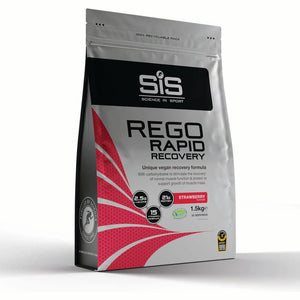It’s your choice - with our knowledge.

Product Insights
Discover more about the products in this article

Tailwind Recovery Mix
Featured Products
Recovery Nutrition for Endurance Athletes
When preparing for long endurance events, recovery becomes crucial for maintaining high training volumes, especially during peak weeks. Proper recovery helps our sessions feel more manageable and allows us to perform at our best consistently. Below, we’ll explore key nutrition strategies to optimise your recovery and ensure you’re ready to tackle every training session.
Carbohydrate Replenishment
After exercise, our muscle glycogen stores become depleted. If we don’t replenish them, our next training sessions can feel tougher, leading to reduced performance, increased fatigue, and impaired immune function. Fortunately, we can minimise this by following a few simple guidelines:
- Aim to consume 1 - 1.2g of carbohydrates per kilogram of body weight within the first two hours after exercise, this is when glycogen replenishment is most efficient.
- Opt for easily digestible carbohydrates during this window to kickstart recovery. More complex carbohydrates can be introduced later in the day to support ongoing energy needs.
Top Picks:
Protein Requirements
Exercise causes small amounts of muscle damage, which is a normal part of the training process. During recovery, our muscles rebuild and adapt, but this can’t happen effectively without an adequate supply of amino acids. Without enough protein, we risk prolonged soreness, impaired recovery, and reduced performance. On the other hand, meeting our protein needs supports muscle repair, adaptation, and growth.
- Aim to consume at least 20g of protein within two hours after training, then
continue to consume protein every 3 - 4 hours throughout the day to keep your body in a muscle-building state. - A casein protein supplement before bed can further support overnight muscle
repair and recovery.
Top Picks:
Rehydration & Replacing lost Electrolytes
After training, we lose fluids and electrolytes primarily through sweat, and the amount lost can vary based on exercise intensity and environmental conditions. When training sessions are scheduled close together, it's especially important to rehydrate efficiently to support performance and recovery.
- Aim to consume 1.25 to 1.5 times the volume of fluid lost during exercise.
- Sip fluids in small, frequent amounts to enhance absorption and promote optimal
hydration. - Combine water with an electrolyte supplement to support fluid retention and
replace key minerals lost through sweat. Electrolytes also help stimulate thirst,
encouraging better rehydration, particularly when recovery time is limited between sessions.
Top Picks:
Practical Top Tips for Recovery
When time is short, it’s easy to let recovery slip through the cracks. These quick and effective strategies can help you stay on track without overthinking it, perfect for busy days or back-to-back sessions.
- Combine carbs and protein: If you’re unable to get enough carbohydrates in right after training, pairing them with protein can still effectively support muscle glycogen replenishment and recovery.
- Opt for liquid recovery options: Drinks that combine carbohydrates, protein, and fluids are a convenient all-in-one solution. They’re easy to store, quick to consume, and ideal when you’re on the go or short on time.
Top Picks:
By following these recovery nutrition strategies, you’ll set yourself up to enter every training session and race fully fuelled, well recovered, and ready to perform at your best, before the workout even begins.
Connie Jones SENr ANutr is a registered associate nutritionist with the AfN and a registered sports and exercise nutritionist under the BDA.
Website: Visit Website | Instagram: @connierosenutrition
It’s your choice - with our knowledge.


















































































































